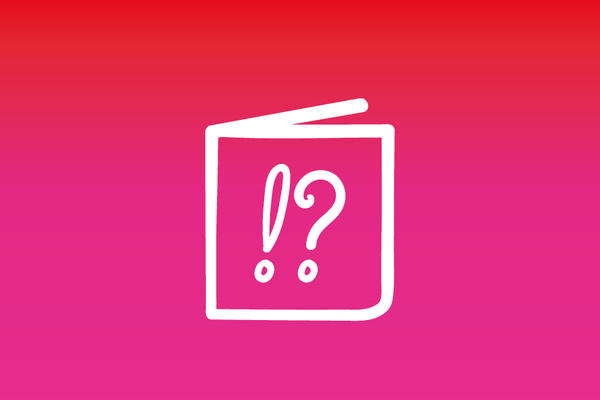
How-To
Step by step to a better life – these books put you on the right track.
Focus on: How-to books for the climate-conscious
Tips for a better, sustainable life
Can humankind still be saved? Although climate change threatens our lives, politics has been dragging its feet in facing the challenges before us. So let’s start doing what we can ourselves.
According to the “Plastic Atlas 2019”, Germans are among the largest source of plastic waste in Europe. That works out to 38 kilogrammes of plastic waste per capita every year. Over the years, according to statistics from 2017, the country produced a total of 18.7 million tonnes of packaging waste – or an average of 226.5 kilogrammes per person. Actually, it is not so difficult to reduce one's personal output of waste, explains Kate Arnell in “Zero Waste for Beginners”. Whether in the bathroom, kitchen, or office, her tips and tricks promise successful results everywhere.

Kate Arnell: Zero Waste for Beginners
Less waste in 6 weeks step-by-step.
Dorling Kindersley, 224 pages, 16.95 €
A big impact through small steps is the whole point of the book “Family for Future”: avoiding waste, saving energy, ideas for more sustainability in personal care, clothing, holidays and hobbies – saving the world starts with the little things, and can even be fun.

Henrike Raggen: Family for Future
The big environmental book for the whole family. 365 ways to a better world.
NGV, 256 pages, 10.00 €
The compact how-to book “Saving the World: How to Make it Work” jumps on the same bandwagon. The mantra of authors Anja Haider-Wallner and Mona Haider is: “We don't have to move mountains in order to make our world a little better and more pleasant.” They offer answers to everyday questions on the topics of food, shopping, travel, and much more.

Anja Haider-Wallner und Mona Haider: Saving the World: How to Make it Work
Mankau, 158 pages, 12.00 €
If that is not enough to motivate you, perhaps Janine Steeger's how-to book “Going Green” is just what the doctor ordered. The former RTL moderator humorously describes her laborious conversion from trashing the environment to protecting it.

Janine Steeger: Going Green
Why you don't need to be perfect to protect our climate.
Oekom, 176 pages, 16.00 €
Back to the topic of avoiding waste: nowadays even groceries wind up in the rubbish all too quickly. Not at all necessary, according to the ecotrophologist Anne Iburg, and in “Is That Still Good or Should We Toss It?” she offers a wealth of tips – such as the best way to store fruit, or what can be conjured up using leftovers.

Anne Iburg: Ist das noch gut oder muss das weg?
(English: Is That Still Good or Should We Toss It?)
Everything about shelf-life, spoiled foodstuffs, storage tips and leftover recipes.
Frech, 144 pages, 15.00 €
Even the topic of housekeeping can be approached from the viewpoint of sustainability. In her book “The Green Life. A Guide to Sustainable Living”, household expert Marion Hellweg has compiled a concept of what an environmentally conscious and mindful lifestyle can look like. The book is rounded out with practical tips and a materials guide that explains how wood, bamboo, natural stone, and textiles help to create a healthy living climate.

Marion Hellweg: The Green Life: Der Wohn-Guide für ein nachhaltiges Leben
Umweltfreundlich, natürlich, plastikfrei.
(English: The Green Life. A Guide to Sustainable Living)
Environmentally friendly, natural, plastic-free.
Prestel, 224 pages, 26.00 €
Although it is essential to adapt one's own behaviour to better protecting the environment and saving resources, it is also important not to lose the big picture. “102 Green Maps to Save the World” offers concise and compact information on current issues. The maps and infographics also show how drastic conditions have become in parts of the world. For example, which countries most heavily pollute the oceans with plastic waste. But also where the most bicycle paths are being built, and which regions of the earth are capable of being reforested.

Katapult: 102 Green Maps to Save the World
Suhrkamp, 203 pages, 22.00 €
Text: Daniel Seitz
Talk with Christof Herrmann
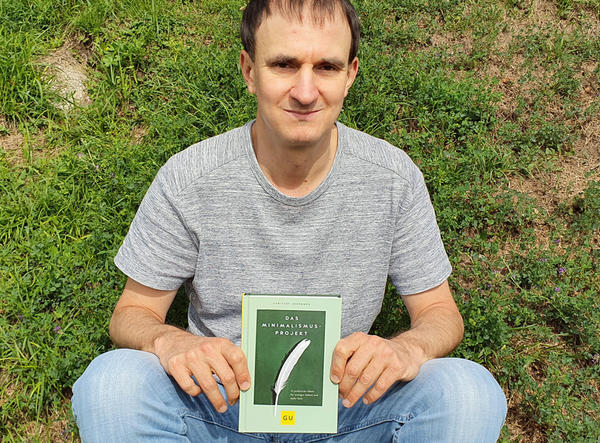
© privat
“Simply do it, and do it simply”
We all know what it's like: too many clothes in the closet, an overbooked schedule, messages flooding our mobile phone, and a job that offers no satisfaction. Minimalism expert Christof Herrmann shows us how to cast off unneeded ballast and make our lives happier.
In your book “The Minimalism Project” you advocate purging your life. How did you come to this idea?
Christof Herrmann: 15 years ago, I had a life just like many of us. Nine-to-five job, well paid, but no fun at all. Commuting, overtime. I was tired, drained, dissatisfied. I quit my job, gave up my apartment, cancelled most of my insurance policies and started touring the world by bicycle. 20,000 kilometres and a year-and-a-half of freedom. Everything I needed to live and be happy fit into five saddlebags. Back home, I knew that I was ready to live more simply and consciously here, as well.
What does your life look like today? What all have you given up?
I wound up selling more than 10,000 things, but I gave away or donated even more. Today I own around 1,000 things, all of which I use and need. I also cast off a lot of ballast in other areas of my life. I was able to find my true vocation in writing and long-distance hiking. I have published a number of hiking guides and my website, Einfach bewusst(opens in a new window) (“Simply Aware”), is one of the most-read German language minimalist blogs. My how-to book “The Minimalism Project” presents the quintessence of my knowledge and experiences over the past 15 years.
Lots of people want to rid themselves of ballast – but where to start?
I would start with anything that seems to be particularly weighty. And not just in the material sense. It may also mean clearing out your schedule, your mind, or your circle of friends and acquaintances. But if you cannot bring yourself to approach the really heavy issues, you can always start out with something lighter. The main thing is to get started, to change something in your life, to get active. Clearing out a single drawer often has a liberating effect and inspires you to keep going.

Christof Herrmann: Das Minimalismus-Projekt – 52 praktische Ideen für weniger Haben und mehr Sein.
(English: The Minimalism Project - 52 practical ideas for having less and being more.)
Gräfe und Unzer, 240 pages, 17.99 €
For most of us, we really need to start clearing things out from the top down. What is the best approach?
In my how-to book, I describe five methods in detail. Here are two in a nutshell: 1. Reverse shopping. Go through your home with a basket and toss in everything you no longer need. 2. The tabula rasa approach is more thorough, starting with completely emptying out one area, for example your clothes closet. Remove all the clothes from your sight, to some place like a storeroom. In the following days and weeks, bring back only those items that you need and (are happy to) wear. You will find that those items are astonishingly few.
What would you especially emphasise for beginners at minimalism?
The minimalist lifestyle is not about owning as little as possible. This realisation eases the pressure and motivates you to clear out the right corners. If you enjoy keeping a large library and also use it, then you should continue maintaining and caring for it. And minimalism is not just about clearing out objects, but rather finding out what ballast means for you, and then ridding yourself of it step by step. I find the following mantra helpful: Simply do it, and do it simply.
Interview: Eckart Baier
Book recommendation
Getting started as “fair” world travellers
Mass tourism with all its excesses has come to heighten our desire for more ecological travel options. Christoph Schulz offers concrete tips on how to plan our holidays as environmentally friendly, fairly and sustainably as possible.
When was the last time your holiday left you with a bad conscience? When you strayed off the marked slopes while skiing? When your cruise ship moored in Venice or when you and hundreds of other tourists stood and photographed baby turtles hatching on the beach? Germans are still just as travel-happy as ever – even though the coronavirus ruined many plans this year. Diving in Bali, crossing Canada in a camper, a beach holiday on Ibiza – no problem whatsoever. But unfortunately, our travels leave an enormous ecological footprint. Many of us are already fully aware of this: 70 percent of Germans would like to travel more sustainably, but only seven percent do so, writes Christoph Schulz in his how-to book. And it is not just the flight that weighs so heavily on the balance; it’s also the careless disposal of rubbish, the trampling of plants, or not obeying the rules and regulations at our destination.
Those who want to travel in a more ecologically friendly and sustainable fashion will find that the author, an ecological scientist dedicated to reducing plastic waste through his CareElite project, has a wealth of practical tips. Clearly, it all starts with booking and planning. Whenever possible, we should travel off-season, not just for reasons of cost but also in order to ease the burden on the infrastructure at our destination, and last-minute offers also help fill unused capacity. Absolute no-goes from the viewpoint of sustainability are cruises, all-inclusive trips and ski holidays in regions with only artificial snow. In addition, Schulz knows how to plan trips, what best to pack, and how to behave as tourists when we arrive.

Christoph Schulz: Nachhaltig reisen für Einsteiger
Umweltfreundlich Urlaub machen und die Welt entdecken.
(English: Sustainable Travel for Beginners
Discovering the world through environmentally friendly travel)
mvg, 208 pages, 14.99 €
The choice of transportation plays a key role in determining the ecological balance. It is obvious to all that aeroplane trips are disastrous in this aspect – but even here Schulz has constructive suggestions on how to travel reasonably and contribute one's share without having to give up on that dream trip.
Sustainable travel is a process of personal development and not a one-off gesture, writes Schulz: “It's long-haul – not quick trip.” His how-to book offers outstanding recommendations on how to start discovering the world in a more environmentally friendly way.
Text: Daniel Seitz
Reading tips
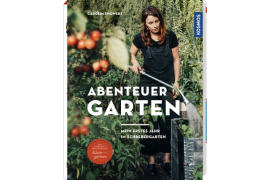
Carolin Engwert: Abenteuer Garten
Mein erstes Jahr im Schrebergarten.
(English: Adventures in Gardening
My first year in the garden allotment)
Kosmos, 160 pages, 20.00 €
Carolin Engwert: Abenteuer Garten
Mein erstes Jahr im Schrebergarten.
(English: Adventures in Gardening
My first year in the garden allotment)
Kosmos, 160 pages, 20.00 €
The joy of big-city gardening
Urban garden allotments are experiencing a boom – most of all with younger big-city residents who long for a small patch of nature and room to grow for their children and their spirits. That is how Berlin gardener and garden blogger Carolin Engwert got started. How do you go about finding an allotment? What is important when buying or leasing? Her book offers checklists for newcomers to get started and guides them along with her wealth of experience month for month through the gardening seasons. Snappy, pragmatic and practice-based, her how-to guide leaves no questions open from cultivating seeds to processing the harvest. And not just for novices, but anyone who likes the feel of a spade in their hand. (ana)
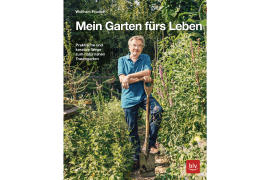
Wolfram Franke: Mein Garten fürs Leben
Praktische und kreative Wege zum naturnahen Traumgarten.
(English: My Garden for Life
Practical and creative ways to create a natural dream garden)
blv, 312 pages, 30.00 €
Wolfram Franke: Mein Garten fürs Leben
Praktische und kreative Wege zum naturnahen Traumgarten.
(English: My Garden for Life
Practical and creative ways to create a natural dream garden)
blv, 312 pages, 30.00 €
Inspiration for your dream garden
Who hasn't dreamed of turning a plot of land or wilderness into a creative and pristine garden? But how does one select trees and shrubs, lay out beds, plan a garden shed or put in a pond? With “Mein Garten fürs Leben” (My Garden for Life), Wolfram Franke offers an entirely unique gardening book with creative answers and professional tips for any and all questions. And even more: the experienced chief editor of the magazine “kraut & rüben” (cabbage & turnips) contributes his passion and enthusiasm for gardening, planning and building, which readers everywhere will find inspiring and enriching. (ds)
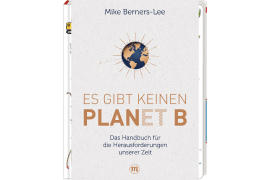
Mike Berners-Lee: Es gibt keinen Planet B
Das Handbuch für die großen Herausforderungen unserer Zeit.
(English: There Is No Planet B: A Handbook for the Make Or Break Years)
Midas, 320 pages, 25.00 €
Mike Berners-Lee: Es gibt keinen Planet B
Das Handbuch für die großen Herausforderungen unserer Zeit.
(English: There Is No Planet B: A Handbook for the Make Or Break Years)
Midas, 320 pages, 25.00 €
How to make change succeed
For thousands of years, the Earth's ecological system was stable. But over the past 50 years, the situation has changed drastically. Population explosion, predatory exploitation of nature and climate change are enormous challenges to overcome – there is no Planet B. If we want to effect change, we need to think and act differently, globally as well as privately. How can we ensure it succeeds? Mike Berners-Lee offers solid answers and tips for all the pressing issues: from nutrition through energy and traffic to questions of values and truth. An enormously important book that should be required reading. (ds)
Portrait of: Dietrich Grönemeyer
Body, heart and soul experts
Natural healing methods and conventional medicine should be more closely integrated, according to Dr. Dietrich Grönemeyer, author and physician. His latest book is a compendium of his medical knowledge and offers practical tips on dealing with common ailments.
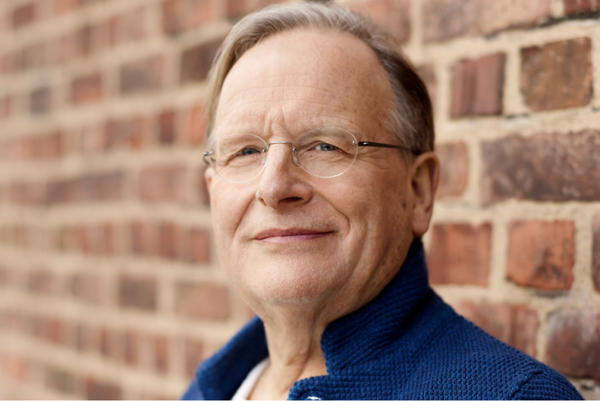
© Gaby Gerster
The art of healing as a family tradition: Dr. Dietrich Grönemeyer belongs to the sixth generation in a family of doctors. One of his ancestors was a conventionally trained physician and pioneer of natural medicine who, at the start of the 19th century, discovered the therapeutic effects of medicinal mud. From his childhood on, the 67-year-old physician has been familiar with both traditions, naturopathy and conventional medicine. “I pretty much grew up between antibiotics and natural remedies,” stated Grönemeyer in an interview. He is not only a pain and micro-therapist, but also a radiologist, an area of specialisation that relies to a great extent on the achievements of medical technology.
His biography and his background have thus made him very aware that a high degree of specialisation and the latest in modern technology do not necessarily lead to perfection in the art of healing. For that, writes Grönemeyer in his new book, we need “mutually enhancing cooperation between conventional medicine and naturopathy”. “What we are missing is a strong awareness of the need for cooperation – also for the realm of natural healing.”

Dietrich Grönemeyer: Naturmedizin und Schulmedizin! Mein gesammeltes Gesundheitswissen wichtiger Volkskrankheiten.
(English: Naturopathy and Conventional Medicine! My Collected Medical Knowledge of Major Common Illnesses) S. Fischer, 336 pages, 24.00 €
And it is exactly this holistic approach, viewing the patient as a unity of body, soul and mind, that forms the focus of Grönemeyer's book “Naturmedizin und Schulmedizin!” (Naturopathy and Conventional Medicine!). It is about illnesses and complaints that we all suffer from, such as coughs, sniffles, the flu, lumbago, and sleep disorders, but also classic widespread ailments such as arteriosclerosis, varicose veins, osteoporosis, and diabetes mellitus. In great detail, Grönemeyer covers the causes and reasons why our motor stutters, why our intestines rumble, our back gives out, or why we just feel poorly. The experienced physician offers orientation and provides valuable tips on when pills, injections, or operations are called for, and when it makes more sense to try out natural healing methods, exercise therapy, and balanced nutrition.
In his book, Grönemeyer devotes a great deal of attention to psychological problems like depressive states, burn-out, and anxiety disorders. The reason for them is often that our everyday life no longer leaves us the chance to relax and recover. “Balance is the secret to all well-being”, writes Grönemeyer. Whenever we are overcome with a bad mood, when we feel listless and low-spirited, then it is high time “to do something good for our body to soothe our soul”. Otherwise we run the risk that the psychological strains will manifest themselves in physical ailments. “Psyche and the body are quick to place strain on each other. Sleep disorders, anxiety disorders, and depression inevitably follow.”
In his last book “World Medicine” Dietrich Grönemeyer looked far beyond the borders of his profession. He travelled the whole world to find out in Africa, China, Brazil, and Korea how ancient knowledge and alternative healing methods can enhance and enrich Western medicine. In his most recent book, Grönemeyer calls on us to resort to this “arsenal of world medicine”, to achieve a balanced cooperative effect using various methods for the benefit of patients to reduce physical illnesses, pain, and psychological conditions.
Text: Daniel Seitz
Newsletter
Stay up to date about trends, offers and relevant news by subscribing to our newsletter.
